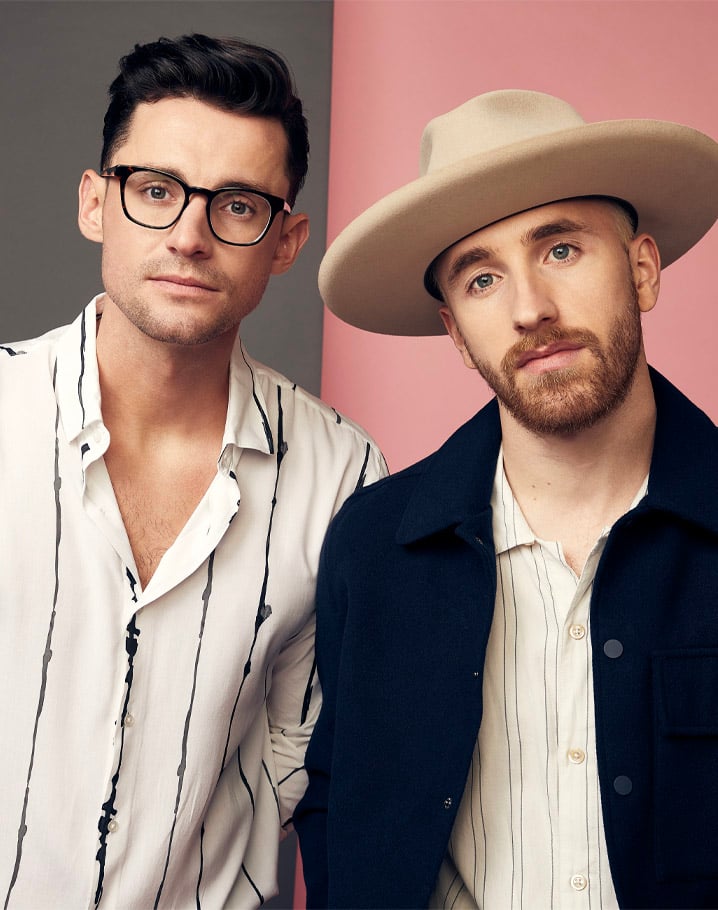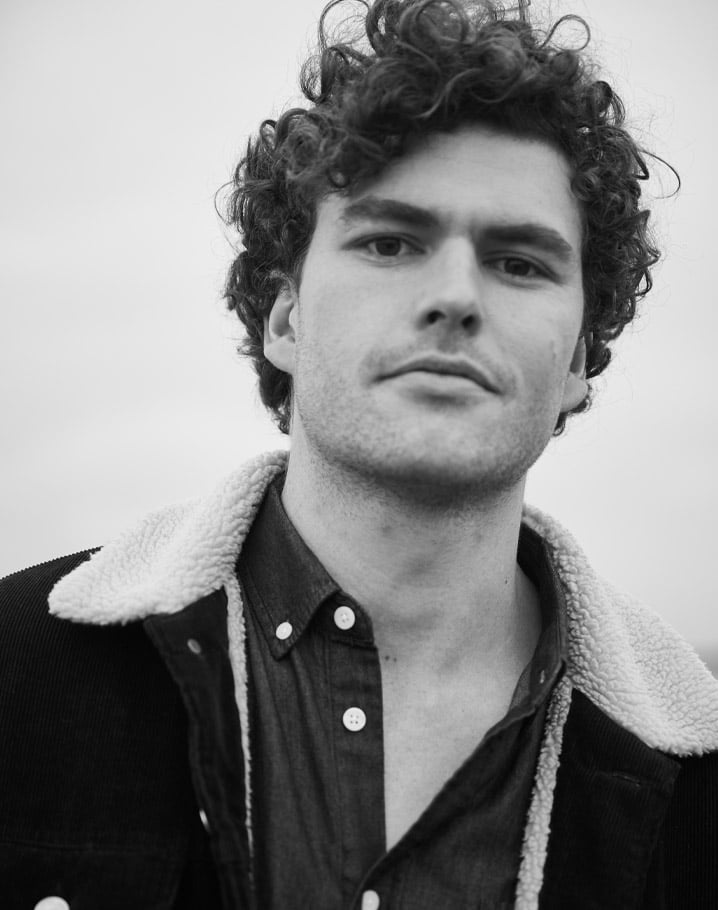Rolling Stone’s 50 Greatest Australian Artists of All Time
For as long as music has existed, so too have artists, and corresponding opinions about which of these artists is better. Any sort of discussion about music and varying degrees of greatness is guaranteed to become one of the most contentious topics imaginable, but often, these heated discussions about music tend to overlook the exceptional artists born and bred in our own backyard.
In a year when a global pandemic has emptied stages the world over, and musicians need support more than ever, we felt it was time to set our sights on the Australian names who have helped put local music on the map here and abroad. Thus, the idea for the 50 Greatest Australian Artists of All Time was born.
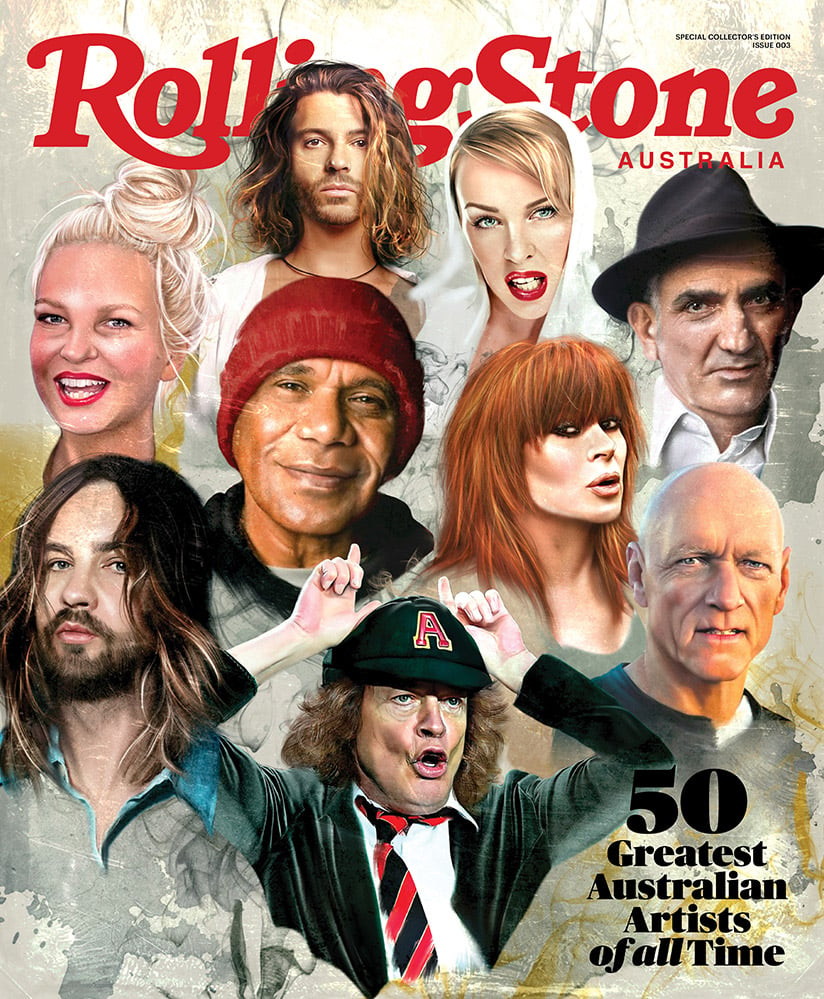
Cover illustration by Debb Oliver.
Originating as an idea for an online feature, our vision soon became more grandiose. Before long, we were receiving and tabulating suggested inclusions of hundreds of Australian artists, from critics, music industry figureheads, past Rolling Stone Editors and writers. This list has been laboured over by some of the most respected names in music.
Paired with testimonials from fellow artists, whether they be veterans or contemporaries, the result is a list which is bound to be one that generates countless hours of discussion and debate but one that also seeks to honour the immeasurable musical contributions from artists that call Australia home.
Their legacies may be long-lasting, or they may be names helping to bring newfound focus onto this great southern land, but at the heart of it all lies an inextricable link with the musical fabric of Australia.

Tina Arena
I remember the first time I heard Tina Arena. It was 1996 and I was nine, sitting in the front passenger seat of my mum’s old beamer, listening to her belt out the lyrics to “Heaven Help My Heart”. My parents had separated that year, and the trips to and from school were bookended by four artists on repeat in mum’s CD-stacker: The Pretenders, The Divinyls, Madonna, and Tina.
I remember the sound of her voice – pure and commanding in the way a shooting star might burn through the sky on its way somewhere. She knew what it was like to fail and fall and get back up again. I could feel it in her voice and in the way my mother cried along to her songs.
They were strident, yearning reflections of a woman finding her feet again, jostling for a little independence in a world that had tried to break her spirit. The melodies were massive but the sentiment was simple and sincere. It takes a certain calibre of artist to tell that kind of story, like it’s being sung out of a mountain while speaking right to you.
"I could feel it in her voice and in the way my mother cried along to her songs."
And a certain kind of songwriter to uncomplicate the truth.
Those songs still fill me with a big sky, deep water feeling I don’t fully understand.
My father is Italian, my mother is Australian, my culture is Italo-Australian, and so for me Tina has always represented the pride and possibility in being both. She is the epitome of an Australian treasure – a timeless voice that keeps soaring. Maybe they could play her a bit more on the radio, eh?
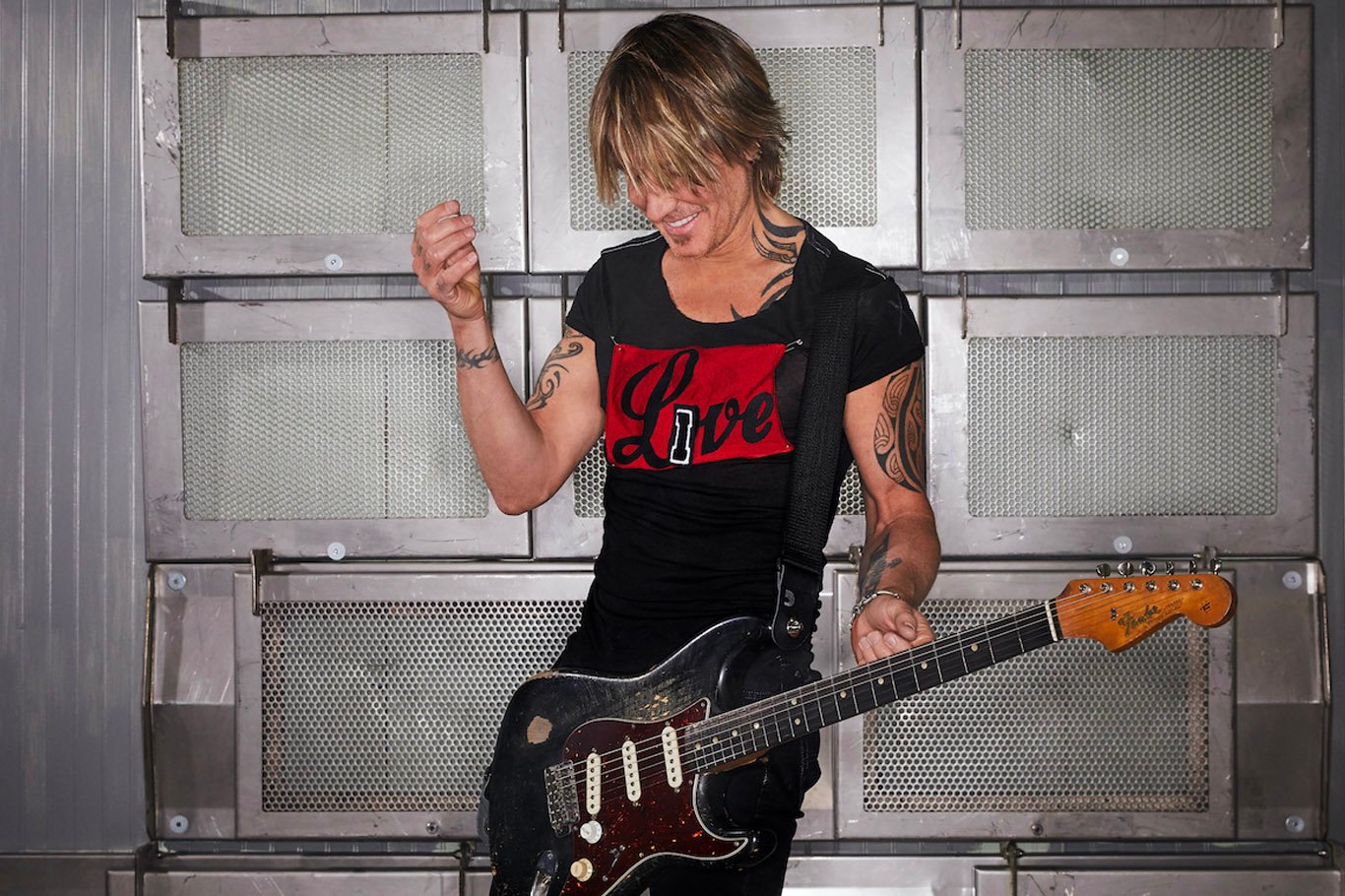
Keith Urban
Driving down Nashville’s Lower Broadway, you see a few things: Cowboy hats, bachelorette parties, honky-tonks brimming with world-class musicians. And right at the top of the strip is a mural, “Legends Corner,” with country music heroes from Johnny Cash to Loretta Lynn to Garth Brooks gathered around a small table. And perched right in the middle, next to Merle Haggard, is Australia’s own Keith Urban.
If this isn’t testament enough to his still thriving career, add over 15 million albums sold, 20 number one singles, four Grammys, 15 ACM Awards, 13 CMA Awards (including 2018 Entertainer Of The Year) – you get where we’re going with this.
We discovered Keith around sixth grade, and for both of us, it was a lightbulb moment. Keith’s vocal melodies, storytelling lyrics and guitar licks combined, was unlike anything either of us had heard before. We’ve both played music since we were very young, but once Mitch heard “Clutterbilly” and Tom heard “Who Wouldn’t Wanna Be Me,” Keith instantly became our compass, pointing us in the musical direction we hadn’t known we had been searching for.
"Keith instantly became our compass, pointing us in the musical direction we hadn’t known we had been searching for."
Put on any of his records, from Golden Road, to Love, Pain & The Whole Crazy Thing, to our personal favourite, Defying Gravity, and we dare you not to be moved by the truth and sincerity in his songs, his effortless vocal and guitar abilities and his overall message. Then see him perform live, and you’ll be amazed at how he can make every person in the room feel like a part of his show. Watching him as young musicians, we were inspired by his uncanny ability to sing through the guitar just as well as his voice. He can floor a room of any size with just him and an acoustic guitar, as well as with a full band.
More than ten years later, we now live in Nashville and are chasing the same dream Keith once had. We were lucky enough to open for him twice in Australia in December 2019, and not an inch of his passion for what he does has withered since we saw him over a decade ago as two fans with a dream to make country music.
Keith has achieved the highest praises and successes, whilst also maintaining a reputation for being one of the nicest (and best smelling) guys in country music. He’s an inspiration to not only us, but so many other upcoming country artists in Australia and around the world, and we are so glad to see him on this list.

Savage Garden
I was nine years old when I first heard the Savage Garden song “I Want You”. I didn’t know what the song was called then; until I had the lyric book in my hand, I called it “ooohaahwachu”.
I have a distinct memory of playing a game of basketball in the school yard around that time. I suppose it was some kind of out-of-body experience; I was running around on autopilot and that song was amplified loud and clear in my head. It was a feeling of being totally “in the zone”. The song profoundly impacted me.
"The song profoundly impacted me."
Savage Garden’s debut album was the first album I ever bought (well actually mum did). I loved and still love the fast rhythmic lyrics of “I Want You”. Chic-a-cherry cola!
I have so much admiration for the great songwriting of Darren Hayes and Daniel Jones. As one of the many millions of people who have connected with and been moved by their music, I want to say, “thank you, Savage Garden.”
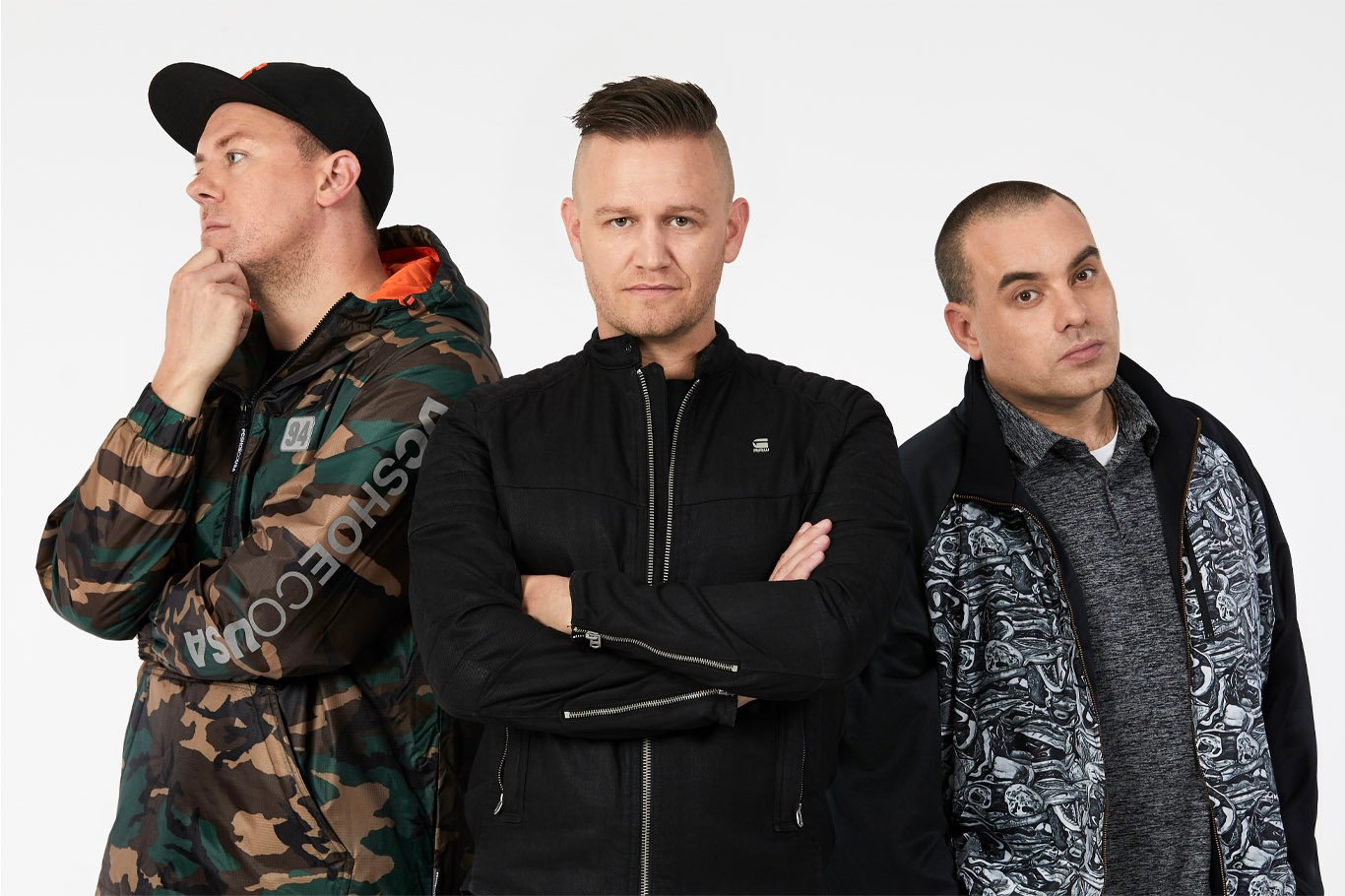
Hilltop Hoods
The Hoods were infamous when I was in my early years of high school growing up in Adelaide. I remember seeing posters and hearing about their sold-out shows from a young age. Without a doubt, they were Adelaide royalty and Australian hip-hop icons. I'm thankful to call these legends brothers now.
The first time I saw them, I had just moved to Melbourne, literally knew nobody and it was my first week there. I saw that the Hoods were in town the week after, I bought my ticket and went alone. It was a taste of home. I also had never seen them live before as it was my first gig as an adult and all of their shows were usually 18+!
I worked my way to the front row of the mosh pit. About halfway through the show Suffa reached out and touched my hand. We made eye contact and every time I perform onstage next to them now it still trips me out. We’ve performed over 50 times together now all over the world and I’m so grateful for the experience.
"Every time I perform on stage next to them now it still trips me out."
A dream come true was featuring on a song with them. And now, after touring the world with them from Europe to America, I honestly see them as the best family team, with the best work ethic, and the best humble attitudes I've ever seen. I’m so grateful to soak up their knowledge and learn from them.
They've been a big part of my life thus far and inspirational to me, not just in music but in family life. They are truly the best group of guys and best team and families you could ever work with and meet.
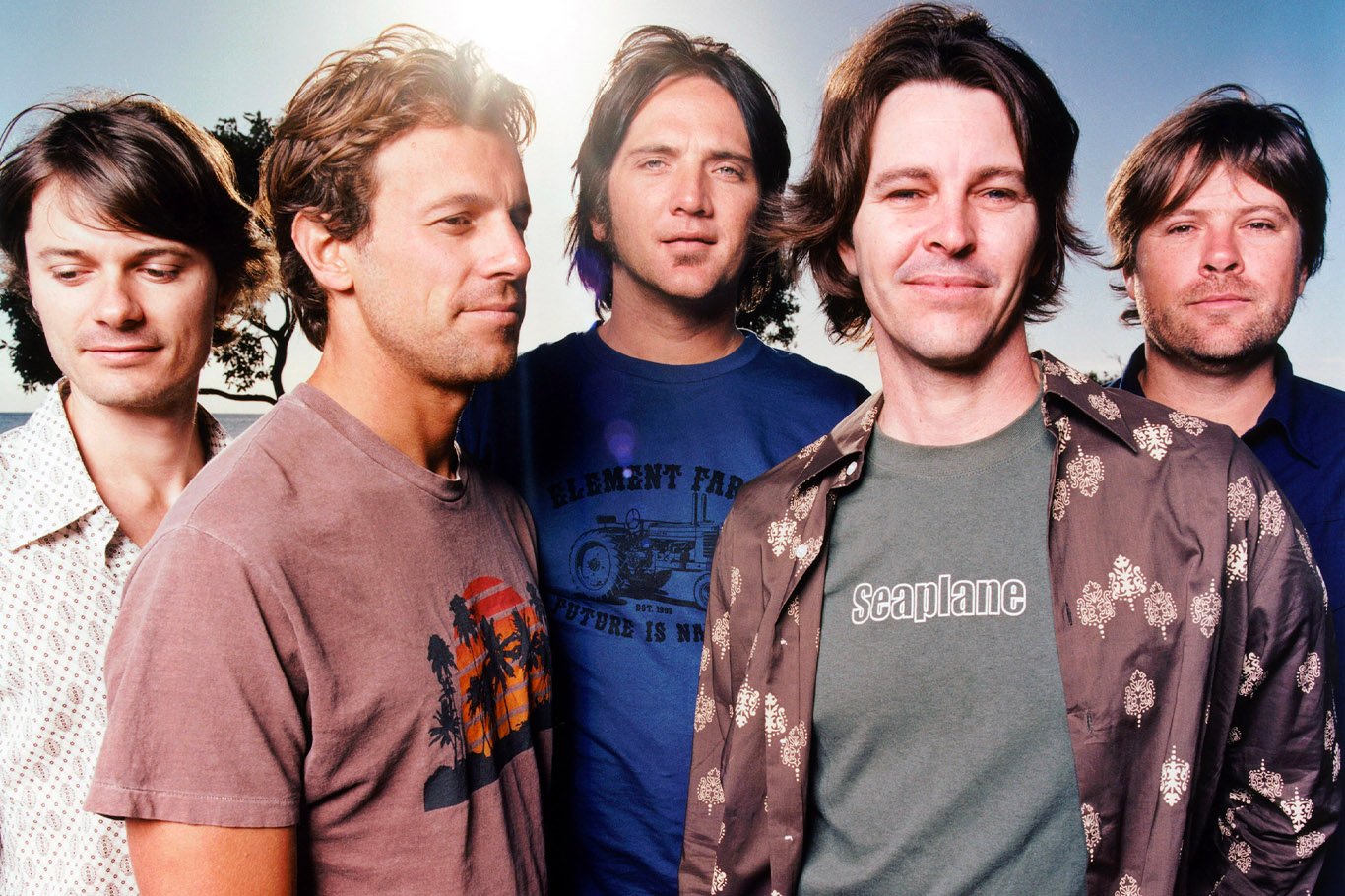
Powderfinger
I never remember a time that Powderfinger wasn’t part of what makes up my musical tapestry, they were always just there. I had Internationalist, I had Odyssey Number Five, I had Vulture Street. All those albums seemed to just be with me already, I never remember a time when Powderfinger weren’t there, that they weren’t a part of my life.
I do remember watching the Big Day Out 2001 on TV and hearing those first chords of “Passenger”, and seeing a sea of people swaying together, and I remember the absolute power they commanded over 60,000 people. Bernard started to sing, and 60,000 people sang the words right back at him. Powderfinger didn’t write songs, they wrote anthems.
Every song became a staple of Australian music; those songs became the soundtrack to our lives. We grew up with them. Moments big and small became tied to lyrics. While Bernard sang about love and loss, he also tackled issues few others were prepared to get into. Political unrest in our country, the rise of the One Nation party as sung about in “The Day You Come”, or the Stolen Generation and racial injustice. These were issues that weren’t really being addressed by other bands at the time. They were brave enough to use their platform to entertain and to educate young Australians.
"Powderfinger didn’t write songs, they wrote anthems."
I remember attending the Powderfinger Live At The Wireless gig in 2004 and watching them glide onstage as musical heavyweights. Bernard Fanning began to howl on his harmonica; John Collins played a thunderous bass line; the guitars of Darren Middleton and Ian Haug weaved flawlessly between one another, while Jon Coghill attacked his drums with reckless abandon.
The chorus hit, and a room full of strangers instantly became unified. Together we sang along to song after song. Songs that we lived and breathed, songs that were embedded in our culture as Australians. It felt like church. Rock‘n’roll church. To be able to create such an energy with instruments and vocals like that, is nothing short of Godlike. I’ve seen them play in stadiums, I’ve seen them play to 1,000 people, and the intensity and emotion is always the same. I’ve never walked away from a Powderfinger gig unsatisfied or uninspired.
https://www.youtube.com/watch?v=7XaSm9-r_4U
Up until their very last record, they were still writing music that I thought was some of their greatest.
Tracks like “Burn Your Name” and “All of The Dreamers” delivered the same impact we had grown accustomed to from them. There was never a dip in quality from Powderfinger.
I remember being in the audience for their final gig at the Riverstage in 2010, listening one last time to them play “These Days”, knowing it was all about to end and feeling a sense of grief yet huge appreciation. A feeling I shared with the other 10,000 people in attendance.
This was our band. A band we felt we owned a little bit of, because they were so much a part of us. They were from Brisbane, just like us. Homegrown heroes, who took the world by storm.
Every time I walk around Brisbane I feel the connection to Powderfinger. Every time I walk up the Brunswick Street Mall, I see their plaque on the ground and read it.
As I write this, I’m only a short walk away from Vulture Street, the title of the band’s fifth album, named after where their rehearsal space was. I drive down Vulture Street every day, and I always think of Powderfinger whenever I see the street sign, that’s where my mind goes to first.
I hear their music all the time on the radio, or walking into a shop, and I’m so pleased when I hear it. It’s so familiar and comforting to know their music will go on forever.
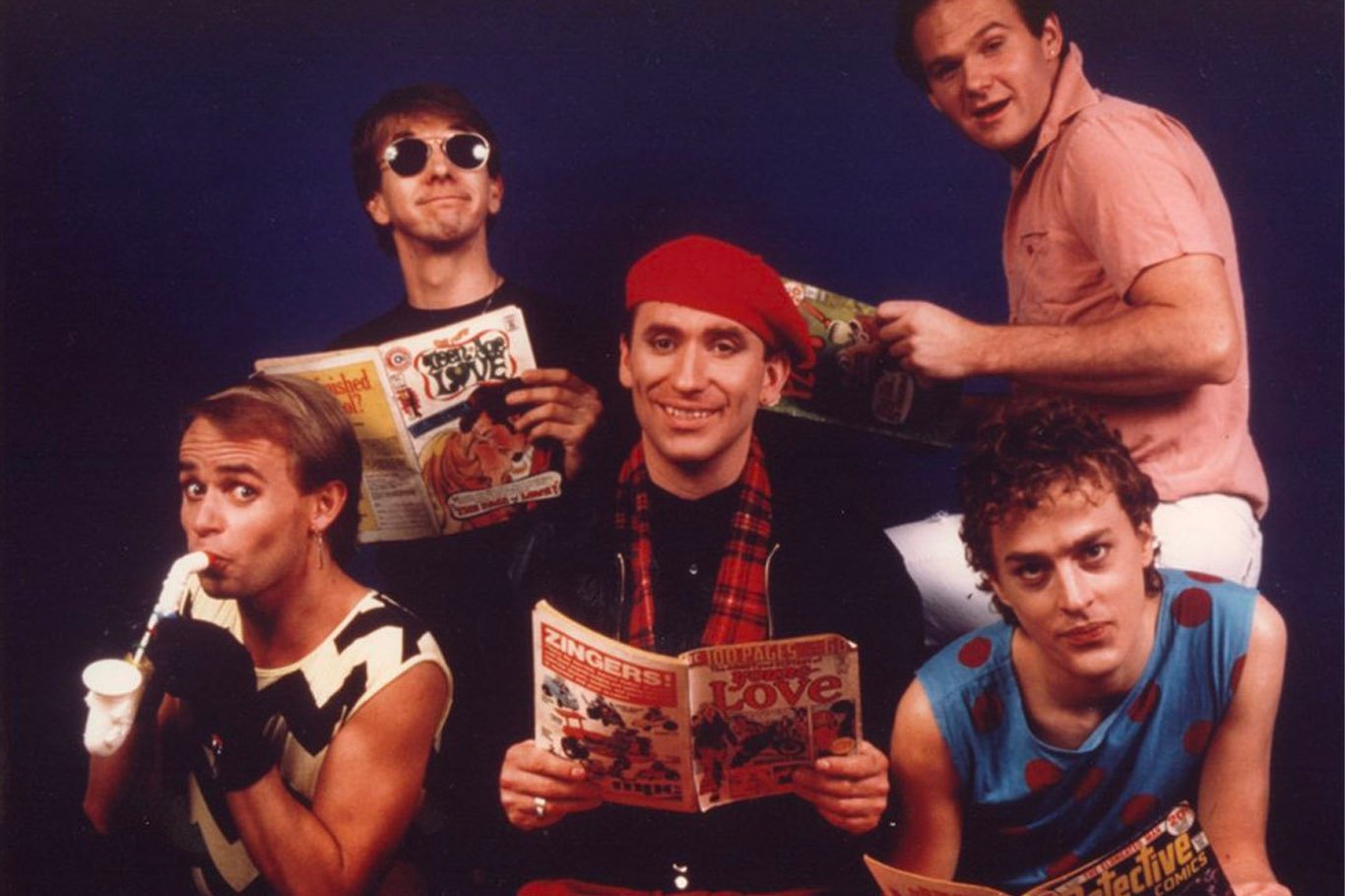
Men At Work
Men At Work was a defining band of my childhood. They were before my time but I became a fan through my parents’ great love for their music. Their songs were a feature of our family road trips and their sound and its energy has had a big impact on me.
I grew up in Mparntwe/Alice Springs in Central Australia and our family holidays meant driving for days to reach the beach. Men At Work’s music was a feature of these trips and I’d sit gazing out the window and watching the landscape change slowly from red to green, daydreaming to the great imagery in their songs and to Colin Hay’s effortless and special voice. Their song “Who Can It Be Now?” was particularly special on these trips. I’d picture vividly a lonely man in his house pushing people away; sad but content. Only much later I started wondering about the deeper messages of fear, isolation and anxiety in the words of that song.
I think the feeling I get when I listen to “Who Can It Be Now?” is what’s so special about Men At Work. In that song, and in their music more generally, they explored a unique space somewhere between playful and melancholy. At once both a sing-along and a journey of introspection. The longer I’ve made songs the more I think about how rare that is – the ability to take people to that special place, both happy and sad, and to hold them there. It’s why I love their work so much and why it still inspires me now.
"Their music fills me with memories from my childhood."
I recently recorded a cover of “Who Can It Be Now?” and it was so important to me that I capture that feeling. To reach back to my childhood and to interpret my relationship to that great song and to reflect that in my own version of it. I think so much of that feeling is in Colin Hay’s voice, which to me is haunting and effortless. I recorded my voice in my own version aiming to recreate Hay’s performance - relaxed, enticing and unique but never overdone. It’s such a rare combination and Hay’s voice and Men At Work’s music is brilliant for it.
I’ve never seen them live, and their rise was well before my time but through my parents I fell in love with their work and I still draw inspiration from it. Their music fills me with memories from my childhood and pulls me to thoughts of driving across our vast country and beneath its big sky (elements I hear reflected in their spacious guitars and big drums). It’s a feeling both light and dark, like leaving home for the open road in search of adventure or as an escape from tragedy. Either way, it’s unique and it’s a special part of our country’s musical story.

Courtney Barnett
When I first moved to Melbourne, I used to go to The Old Bar a lot on my way home from work to sit by the fire and hang out with friends who worked there. Two years in, I was still in awe that you could go to a venue on a freezing Tuesday night and see a band play.
In 2011 I happened to be there when I saw Courtney play for the first time, alongside Bob Harrow from Immigrant Union. I didn’t know who she was, but I ended up missing my tram home to stay and watch their whole set.
Courtney and I had a lot of mutual friends, so in turn, we started seeing each other around the place and became friends over the next couple of years. I’d see her play everywhere from backyard house shows in the pouring rain, to tiny bars with a capacity of around 40. Seeing her then move on to play giant theatres globally, on US talk shows, and playing to mass crowds at some of the world’s biggest festivals was so mind-blowing to watch.
"She brought women playing guitar music back to the mainstream."
The impact she’s had on young Australian artists (women and non-binary people in particular) is huge, and something that we’ll continue to see for many years to come. She brought women playing guitar music back to the mainstream, without having to be dressed up in a certain way or compromising her art.
Courtney and her band are some of the most hard-working people I’ve had the privilege to know, and deserve every success that has come their way. The fact that she is as humble today as she was playing to three people at The Old Bar is a testament to her, and I couldn’t be prouder of someone's success.

Skyhooks
The music of Skyhooks and their members alike represent an Australian psyche that champions good times, free thought and the challenging of stereotypes. They so accurately detailed the social issues and experiences pertaining to young Aussies in the Seventies, and in doing so helped create a quintessential Australian sound that was hard not to tap your foot to.
Skyhooks first proved themselves as a support band who often stole the show, and stayed true to their original style that gathered them growing attention by fans and record labels alike.
Combining a wildly flamboyant aesthetic, eccentric stage personas and frank lyrical depictions, the band had little regard for what was deemed acceptable by the mainstream at that time. It was because of that, the path they forged for Australian rock‘n’roll allowed artists to find success writing about their own everyday experiences in this great southern land.
"Skyhooks’ music is so deeply rooted in local Aussie culture."
Growing up, there was always music playing at home. My brother Lach and I were hugely influenced by what our parents listened to. It was a similar experience for the rest of our bandmates, and since our very first jam sessions in our garage, subconsciously or not, Ocean Alley is built upon the foundations of Seventies rock music. There is so much to take in when it comes to Skyhooks – their music is distinctive, cheeky, unapologetic and oozes with groove… and these are all elements that we hope come through in our own music.
As musicians and songwriters, we’re always looking to experiment with our instruments and push the limits of what we can achieve. So there’s no denying that a band such as Skyhooks - a true cultural phenomenon - has inspired the way we treat music as more than just an aural experience. From the trippy videos to the outrageous costumes and stage theatrics (not to mention the infamous mushroom-shaped phallus), Skyhooks irreverently made rock music fun.
I think because Skyhooks’ music is so deeply rooted in local Aussie culture, their music is just as popular today as it was amongst their diverse and often motley crowds in the Seventies and Eighties. Despite all the irony in their social commentary, nearly 50 years later, songs about identity, sex, drugs and police states are still as relevant now as they were then.
Skyhooks’ honest and genuine contribution to Australian music has given us timeless music, live shows to remember, and many good times to come.

Archie Roach
I was watching a documentary about the McDonald’s Monopoly game. It talked about how they introduced the Happy Meal in 1979 and I thought, “man, I don’t remember life without McDonald’s”. Then I was thinking about what Archie Roach was within communities. For me, even before I heard an Archie Roach song, I knew who he was. I knew what that name was synonymous with.
We never played his music in the house when I was growing up; we weren’t a musical house. And all my cousins were listening to rap music, so it wasn’t like I was getting Archie Roach drummed into me as a kid. Archie Roach wasn’t this figure that was drummed into the soundtrack of my life because truthfully, I didn’t hear his music until much later.
It goes to show, the need for an Aboriginal rockstar was something that was really championed by all communities. At the time, we had him, the Warumpi Band, Jimmy Little (because he was from the same mission as my dad), and Archie; that was it.
We always had, we always knew, Archie Roach. His name resonated within the community as a superhero. Everybody knew that name. Even before I knew the music, or knew who Archie Roach was, I knew of the name. It’s a cool name too – it works.
"His name resonated within the community as a superhero."
As you get older, you get to understand things more, understand what they mean. You really get to appreciate what his story is, and the intensity of his track “Took The Children Away”. I didn’t get to really appreciate Archie Roach’s music properly until I was smart enough to get it, to understand what it meant in the industry. To me, it meant longevity, truthfulness, honesty. Those are the things I really associate with Archie Roach.
Although the music we make is like chalk and cheese, there’s a definite mutual respect between him and I and the salute to artistry. His stories resonate. His stories tell a story of Melbourne and that era that is synonymous with Paul Kelly and artists who were starting the music scene we have now.
Archie’s career really drove me when I decided I was going to be a rapper. I thought, “Okay you can have a career and it can last 40 years, but you have to be smart, you have to be good.” Archie Roach taught me there’s a difference between being the best and being the greatest. It’s about vulnerability and what the artist lets you in on, what they share with you. I think that’s what really separates someone from being technically the best and being the greatest. Being the greatest means you transcended the genre, and what you do impacts culture. You change culture around the world. You change the discussion.
Everyone from the gutter to the top resonates with Archie’s stories, his artistry, his talent, his history and all his work. His four decade-long career and the fact he resonates with different walks of life are testament to that. You see the way an artist like him gets accolades and who is in attendance to pay respect; it’s not by accident. Even to remove myself as a friend, or a fan, and to look at it pragmatically on paper, the facts all add up. If you took Archie’s resumé and put it anywhere, it would land. There’s no argument against that.
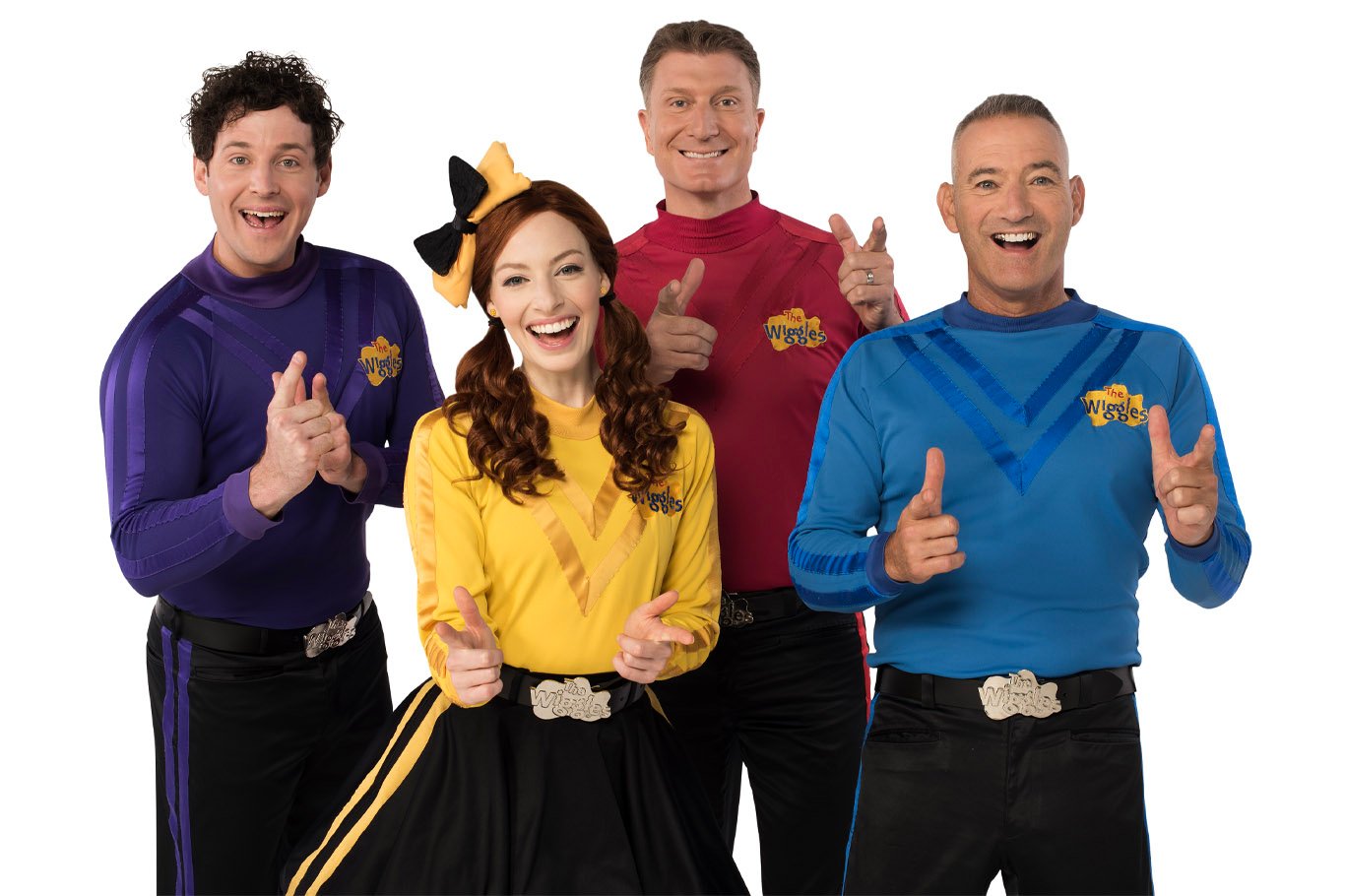
The Wiggles
The “W” word. A band so iconic you don’t even have to say the name. Just one mention of the letter and you’ll find yourself singing along to “Hot Potato” or “Wake Up Jeff”. What started off in Sydney in 1991 with a $4,000 music video and shows to only 12 kids in the room is now a multi-million-dollar enterprise that can sell out Madison Square Garden 12 times over.
The Wiggles have survived and thrived through old and new members, spin-off shows and series’, and even a dash of skivvy swapping controversy. They are everywhere and I mean EVERYWHERE. But the main place they really have cemented themselves is in the minds of every child under five, including my own daughter Siena.
Just press play and her face lights up, she throws her hands in the air and runs around the room in a crazy Wiggle trance that no other music can possibly match (my own included). She doesn’t have a favourite yet, but it’s only a matter of time. Soon a trip to the shops will be impossible unless she’s wearing blue like Anthony or a yellow bow like Emma.
"It’s been 30 years, but that Big Red Car doesn’t look to be slowing down anytime soon."
The music is simple: minimal production and instruments, and the words are even simpler - “hot potato, hot potato” repeated many times! Their colours are iconic, their merch range is out of this world and they’ve even managed to make having a gardening dinosaur in your backyard a completely normal phenomenon. This foursome is so memorable that late at night, long after the kids have gone to bed (and a glass of wine has been poured), my partner and I will find ourselves humming “Rock-A-Bye Your Bear” quietly under our breath. It’s been 30 years, but that Big Red Car doesn’t look to be slowing down anytime soon.
































